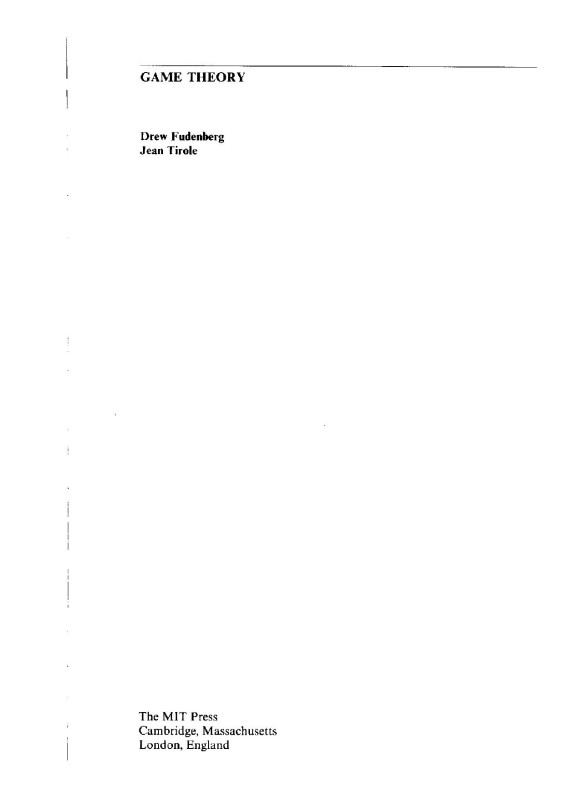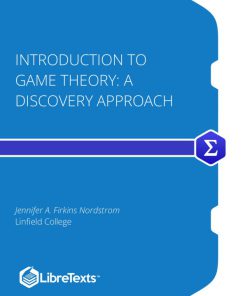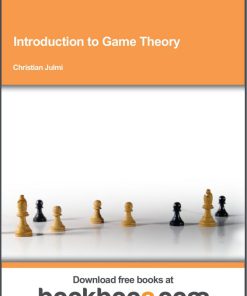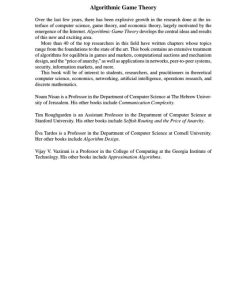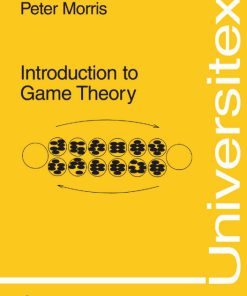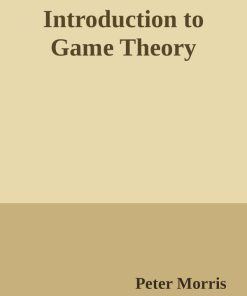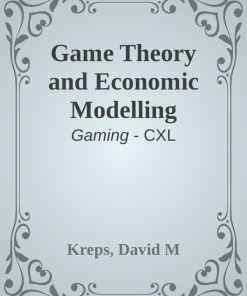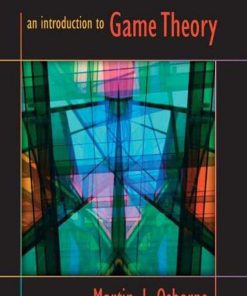Game Theory 1st edition by Drew Fudenberg, Jean Tirole 0262303760 9780262303767
$50.00 Original price was: $50.00.$25.00Current price is: $25.00.
Authors:Fudenberg , Series:Gaming [163] , Author sort:Fudenberg , Languages:Languages:eng , Published:Published:Sep 2005 , Publisher:MIT Press
Game Theory 1st edition by Drew Fudenberg, Jean Tirole – Ebook PDF Instant Download/DeliveryISBN: 0262303760, 9780262303767
Full download Game Theory 1st edition after payment.

Product details:
ISBN-10 : 0262303760
ISBN-13 : 9780262303767
Author : Drew Fudenberg, Jean Tirole
This advanced text introduces the principles of noncooperative game theory in a direct and uncomplicated style that will acquaint students with the broad spectrum of the field while highlighting and explaining what they need to know at any given point. This advanced text introduces the principles of noncooperative game theory—including strategic form games, Nash equilibria, subgame perfection, repeated games, and games of incomplete information—in a direct and uncomplicated style that will acquaint students with the broad spectrum of the field while highlighting and explaining what they need to know at any given point. The analytic material is accompanied by many applications, examples, and exercises. The theory of noncooperative games studies the behavior of agents in any situation where each agent’s optimal choice may depend on a forecast of the opponents’ choices. “Noncooperative” refers to choices that are based on the participant’s perceived selfinterest. Although game theory has been applied to many fields, Fudenberg and Tirole focus on the kinds of game theory that have been most useful in the study of economic problems. They also include some applications to political science. The fourteen chapters are grouped in parts that cover static games of complete information, dynamic games of complete information, static games of incomplete information, dynamic games of incomplete information, and advanced topics.
Game Theory 1st Table of contents:
I Static Games of Complete Information
1 Games in Strategic Form and Nash Equilibrium
1.1 Introduction to Games in Strategic Form and Iterated Strict Dominance
1.1.1 Strategic-Form Games
1.1.2 Dominated Strategies
1.1.3 Applications of the Elimination of Dominated Strategies
1.2 Nash Equilibrium
1.2.1 Definition of Nash Equilibrium
1.2.2 Examples of Pure-Strategy Equilibria
1.2.3 Nonexistence of a Pure-Strategy Equilibrium
1.2.4 Multiple Nash Equilibria, Focal Points, and Pareto Optimality
1.2.5 Nash Equilibrium as the Result of Learning or Evolution
1.3 Existence and Properties of Nash Equilibria
1.3.1 Existence of a Mixed-Strategy Equilibrium
1.3.2 The Nash-Equilibrium Correspondence Has a Closed Graph
1.3.3 Existence of Nash Equilibrium in Infinite Games with Continuous Payoffs
Exercises
References
2 Iterated Strict Dominance, Rationalizability, and Correlated Equilibrium
2.1 Iterated Strict Dominance and Rationalizability
2.1.1 Iterated Strict Dominance: Definition and Properties
2.1.2 An Application of Iterated Strict Dominance
2.1.3 Rationalizability
2.1.4 Rationalizability and Iterated Strict Dominance
2.1.5 Discussion
2.2 Correlated Equilibrium
2.3 Rationalizability and Subjective Correlated Equilibria
Exercises
References
II Dynamic Games of Complete Information
3 Extensive-Form Games
3.1 Introduction
3.2 Commitment and Perfection in Multi-Stage Games with Observed Actions
3.2.1 What Is a Multi-Stage Game?
3.2.2 Backward Induction and Subgame Perfection
3.2.3 The Value of Commitment and “Time Consistency”
3.3 The Extensive Form
3.3.1 Definition
3.3.2 Multi-Stage Games with Observed Actions
3.4 Strategies and Equilibria in Extensive-Form Games
3.4.1 Behavior Strategies
3.4.2 The Strategic-Form Representation of Extensive-Form Games
3.4.3 The Equivalence between Mixed and Behavior Strategies in Games of Perfect Recall
3.4.4 Iterated Strict Dominance and Nash Equilibrium
3.5 Backward Induction and Subgame Perfection
3.6 Critiques of Backward Induction and Subgame Perfection
3.6.1 Critiques of Backward Induction
3.6.2 Critiques of Subgame Perfection
Exercises
References
4 Applications of Multi-Stage Games with Observed Actions
4.1 Introduction
4.2 The Principle of Optimality and Subgame Perfection
4.3 A First Look at Repeated Games
4.3.1 The Repeated Prisoner’s Dilemma
4.3.2 A Finitely Repeated Game with Several Static Equilibria
4.4 The Rubinstein-Ståhl Bargaining Model
4.4.1 A Subgame-Perfect Equilibrium
4.4.2 Uniqueness of the Infinite-Horizon Equilibrium
4.4.3 Comparative Statics
4.5 Simple Timing Games
4.5.1 Definition of Simple Timing Games
4.5.2 The War of Attrition
4.5.3 Preemption Games
4.6 Iterated Conditional Dominance and the Rubinstein Bargaining Game
4.7 Open-Loop and Closed-Loop Equilibria
4.7.1 Definitions
4.7.2 A Two-Period Example
4.7.3 Open-Loop and Closed-Loop Equilibria in Games with Many Players
4.8 Finite-Horizon and Infinite-Horizon Equilibria
Exercises
References
5 Repeated Games
5.1 Repeated Games with Observable Actions
5.1.1 The Model
5.1.2 The Folk Theorem for Infinitely Repeated Games
5.1.3 Characterization of the Equilibrium Set
5.2 Finitely Repeated Games
5.3 Repeated Games with Varying Opponents
5.3.1 Repeated Games with Long-Run and Short-Run Players
5.3.2 Games with Overlapping Generations of Players
5.3.3 Randomly Matched Opponents
5.4 Pareto Perfection and Renegotiation-Proofness in Repeated Games
5.4.1 Introduction
5.4.2 Pareto Perfection in Finitely Repeated Games
5.4.3 Renegotiation-Proofness in Infinitely Repeated Games
5.5 Repeated Games with Imperfect Public Information
5.5.1 The Model
5.5.2 Trigger-Price Strategies
5.5.3 Public Strategies and Public Equilibria
5.5.4 Dynamic Programming and Self-Generation
5.6 The Folk Theorem with Imperfect Public Information
5.7 Changing the Information Structure with the Time Period
Exercises
References
III Static Games of Incomplete Information
6 Bayesian Games and Bayesian Equilibrium
6.1 Incomplete Information
6.2 Example 6.1: Providing a Public Good under Incomplete Information
6.3 The Notions of Type and Strategy
6.4 Bayesian Equilibrium
6.5 Further Examples of Bayesian Equilibria
6.6 Deletion of Strictly Dominated Strategies
6.6.1 Interim vs. Ex Ante Dominance
6.6.2 Examples of Iterated Strict Dominance
6.7 Using Bayesian Equilibria to Justify Mixed Equilibria
6.7.1 Examples
6.7.2 Purification Theorem
6.8 The Distributional Approach
Exercises
References
7 Bayesian Games and Mechanism Design
7.1 Examples of Mechanism Design
7.1.1 Nonlinear Pricing
7.1.2 Auctions
7.2 Mechanism Design and the Revelation Principle
7.3 Mechanism Design with a Single Agent
7.3.1 Implementable Decisions and Allocations
7.3.2 Optimal Mechanisms
7.4 Mechanisms with Several Agents: Feasible Allocations, Budget Balance, and Efficiency
7.4.1 Feasibility under Budget Balance
7.4.2 Dominant Strategy vs. Bayesian Mechanisms
7.4.3 Efficiency Theorems
7.4.4 Inefficiency Theorems
7.4.5 Efficiency Limit Theorems
7.4.6 Strong Inefficiency Limit Theorems
7.5 Mechanism Design with Several Agents: Optimization
7.5.1 Auctions
7.5.2 Efficient Bargaining Processes
7.6 Further Topics in Mechanism Design
7.6.1 Correlated Types
7.6.2 Risk Aversion
7.6.3 Informed Principal
7.6.4 Dynamic Mechanism Design
7.6.5 Common Agency
Appendix
Exercises
References
IV Dynamic Games of Incomplete Information
8 Equilibrium Refinements: Perfect Bayesian Equilibrium, Sequential Equilibrium, and Trembling-Hand Perfection
8.1 Introduction
8.2 Perfect Bayesian Equilibrium in Multi-Stage Games of Incomplete Information
8.2.1 The Basic Signaling Game
8.2.2 Examples of Signaling Games
8.2.3 Multi-Stage Games with Observed Actions and Incomplete Information
8.3 Extensive-Form Refinements
8.3.1 Review of Game Trees
8.3.2 Sequential Equilibrium
8.3.3 Properties of Sequential Equilibrium
8.3.4 Sequential Equilibrium Compared with Perfect Bayesian Equilibrium
8.4 Strategic-Form Refinements
8.4.1 Trembling-Hand Perfect Equilibrium
8.4.2 Proper Equilibrium
Appendix
Exercises
References
9 Reputation Effects
9.1 Introduction
9.2 Games with a Single Long-Run Player
9.2.1 The Chain-Store Game
9.2.2 Reputation Effects with a Single Long-Run Player: The General Case
9.2.3 Extensive-Form Stage Games
9.3 Games with Many Long-Run Players
9.3.1 General Stage Games and General Reputations
9.3.2 Common-Interest Games and Bounded-Recall Reputations
9.4 A Single “Big” Player against Many Simultaneous Long-Lived Opponents
Exercises
References
10 Sequential Bargaining under Incomplete Information
10.1 Introduction
10.2 Intertemporal Price Discrimination: The Single-Sale Model
10.2.1 The Framework
10.2.2 A Two-Period Introduction to Coasian Dynamics
10.2.3 An Infinite-Horizon Example of the Coase Conjecture
10.2.4 The Skimming Property
10.2.5 The Gap Case
10.2.6 The No-Gap Case
10.2.7 Gap vs. No Gap and Extensions of the Single-Sale Model
10.3 Intertemporal Price Discrimination: The Rental or Repeated-Sale Model
10.3.1 Short-Term Contracts
10.3.2 Long-Term Contracts and Renegotiation
10.4 Price Offers by an Informed Player
10.4.1 One-Sided Offers and Bilateral Asymmetric Information
10.4.2 Alternating Offers and One-Sided Asymmetric Information
10.4.3 Mechanism Design and Bargaining
Exercises
References
V Advanced Topics
11 More Equilibrium Refinements: Stability, Forward Induction, and Iterated Weak Dominance
11.1 Strategic Stability
11.2 Signaling Games
11.3 Forward Induction, Iterated Weak Dominance, and “Burning Money”
11.4 Robust Predictions under Payoff Uncertainty
Exercises
References
12 Advanced Topics in Strategic-Form Games
12.1 Generic Properties of Nash Equilibria
12.1.1 Number of Nash Equilibria
12.1.2 Robustness of Equilibria to Payoff Perturbations
12.2 Existence of Nash Equilibrium in Games with Continuous Action Spaces and Discontinuous Payoffs
12.2.1 Existence of a Pure-Strategy Equilibrium
12.2.2 Existence of a Mixed-Strategy Equilibrium
12.3 Supermodular Games
Exercises
References
13 Payoff-Relevant Strategies and Markov Equilibrium
13.1 Markov Equilibria in Specific Classes of Games
13.1.1 Stochastic Games: Definition and Existence of MPE
13.1.2 Separable Sequential Games
13.1.3 Examples from Economics
13.2 Markov Perfect Equilibrium in General Games: Definition and Properties
13.2.1 Definition
13.2.2 Existence
13.2.3 Robustness to Payoff Perturbations
13.3 Differential Games
13.3.1 Definition
13.3.2 Equilibrium Conditions
13.3.3 Linear-Quadratic Differential Games
13.3.4 Technical Issues
13.3.5 Zero-Sum Differential Games
13.4 Capital-Accumulation Games
13.4.1 Open-Loop, Closed-Loop, and Markov Strategies
13.4.2 Differential-Game Strategies
Exercises
References
14 Common Knowledge and Games
14.1 Introduction
14.2 Knowledge and Common Knowledge
14.3 Common Knowledge and Equilibrium
14.3.1 The Dirty Faces and the Sage
14.3.2 Agreeing to Disagree
14.3.3 No-Speculation Theorems
14.3.4 Interim Efficiency and Incomplete Contracts
14.4 Common Knowledge, Almost Common Knowledge, and the Sensitivity of Equilibria to the Information Structure
14.4.1 The Lack of Lower Hemi-Continuity
14.4.2 Lower Hemi-Continuity and Almost Common Knowledge
People also search for Game Theory 1st:
prisoner’s dilemma game theory
evolutionary game theory
ash game theory
saddle point in game theory
algorithmic game theory
You may also like…
eBook PDF
Introduction to Game Theory a Discovery Approach 1st edition by Jennifer Firkins Nordstrom
eBook PDF
Elements of Psychophysical Theory 1st Edition by Jean Claude Falmagne 0195148320 9780195148329
eBook PDF
Game Theory and Economic Modelling 1st Edition by David Kreps ISBN 9780191521331 0191521337

